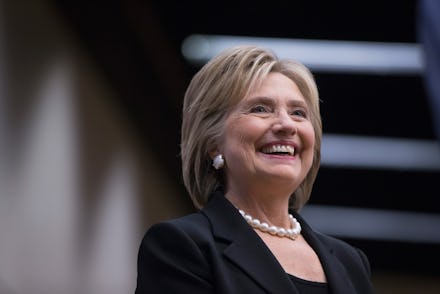Hillary Clinton Just Released a Bold New Platform for LGBT Equality

Democratic presidential frontrunner Hillary Clinton unveiled a comprehensive LGBT equality agenda on Thursday, declaring that six months after the Supreme Court's landmark ruling for nationwide marriage equality in Obergefell v. Hodges, the fight for LGBT rights "remains unfinished."
"As president, I will continue to fight so that LGBT Americans and families can live, work and pray free of discrimination. I will not settle for anything less," Clinton said in a statement released by her campaign. "It is unacceptable that LGBT kids continue to be discriminated against and bullied at school, a restaurant can refuse to serve a transgender person and a same-sex couple is at risk of being evicted from their home."
The plan: The linchpin to Clinton's platform is her support for the Full Equality Act, a piece of legislation proposed this summer that would amend the Civil Rights Act of 1964 to make sexual orientation and gender identity protected classes like race, sex, religion and national origin. The proposal would thereby prohibit anti-LGBT discrimination in housing, employment and public accommodations.
Gay and transgender Americans currently lack any federal nondiscrimination protections. Although some states have enacted LGBT civil rights laws in lieu of federal action, 28 states have no nondiscrimination laws protecting lesbians, gays and bisexuals, while 32 states have yet to ban anti-transgender discrimination, according to the Human Rights Campaign.
While the Full Equality Act faces long odds of passage so long as Congress remains in Republican hands, Clinton also pledged to continue carrying out President Barack Obama's executive actions prohibiting anti-LGBT discrimination targeting federal employees and contractors. Those actions may be in jeopardy if a strong social conservative, like Sen. Ted Cruz (R-Tex.), becomes president.
Homing in on problems afflicting LGBT youth, Clinton called for an end to ex-gay "conversion therapy" plans for minors, legislation to combat bullying, full equality for same-sex parent families and increased social services funding for homeless LGBT youth. Up to 40% of the youth homeless population identifies as LGBT.
Laura Durso, director of the LGBT Research and Communications Project at the Center for American Progress and an expert on LGBT youth homelessness, applauded Clinton's focus on the issue. Homeless LGBT youth "are more likely to experience victimization while on the streets compared to their peers," Durso told Mic, underscoring the urgency of securing shelter and services.
"Services are needed and we need to look at prevention," Durso added. "And we need to be looking not only at things like family rejection, but also things like poverty and families that simply can't afford sometimes to have children in their homes or young people who might leave as a result of abuse."
Meanwhile, Clinton laid out a series of measures to combat HIV/AIDS, including urging Republican governors to expand Medicaid coverage under the Affordable Care Act. Doing so would help patients access treatment, impose a $250 cap on out-of-pocket expenses for prescription drug costs and expand access to pre-exposure prophylaxis, or PrEP, a daily treatment regime that blocks HIV transmission.
The New York Times reports that since Gov. Andrew Cuomo of New York stepped up funding for PrEP as part of a comprehensive anti-HIV/AIDS agenda in mid-2014, the state has seen a threefold increase in prescriptions for the treatment. There have been zero cases of mothers transmitting HIV to their newborn children in New York over the same amount of time.
Clinton also endorsed the right of transgender people to serve openly in the military (the 2010 repeal of "Don't Ask, Don't Tell" allowed open service only for gays, lesbians and bisexuals) and urged more funding for the Global Equality Fund, which she established during her tenure as secretary of state to support LGBT rights and civil society organizations around the globe.
"What's at stake": The rollout of Clinton's LGBT platform sharpens the contrast with her Republican rivals. Though the leading GOP candidates vary in tone and emphasis on LGBT issues, all oppose marriage equality and many, including establishment favorites like Sen. Marco Rubio and former Gov. Jeb Bush of Florida, have argued that businesses and individuals should be allowed to refuse services to LGBT people on religious liberty grounds.
In recent days, Rubio — regarded by many Democrats as one of Clinton's most formidable possible foes — has ramped up his rhetoric on LGBT issues, potentially undercutting his general election appeal to more socially moderate voters. On Sunday, Rubio suggested he would appoint Supreme Court justices who would vote to overturn the court's marriage equality ruling. In a new campaign ad and in his opening statement at Tuesday's presidential debate in Las Vegas, the senator lamented that supporters of "traditional values" are now considered "bigots."
JoDee Winterhof, vice president of policy and public affairs at the Human Rights Campaign, said that the differences between Clinton and the GOP are a reminder of "what's at stake" for LGBT rights in 2016.
"On the one hand we have witnessed pro-equality candidates put forward robust plans to address LGBT discrimination at the federal level, fight the epidemic of violence against transgender Americans, advance equality around the globe and more," Winterhof told Mic. "And on the other side, we've seen an unprecedented level of vocal opposition to LGBT equality from vowing to overturn marriage equality and rushing to Kim Davis' side to treating transgender people as a punchline."